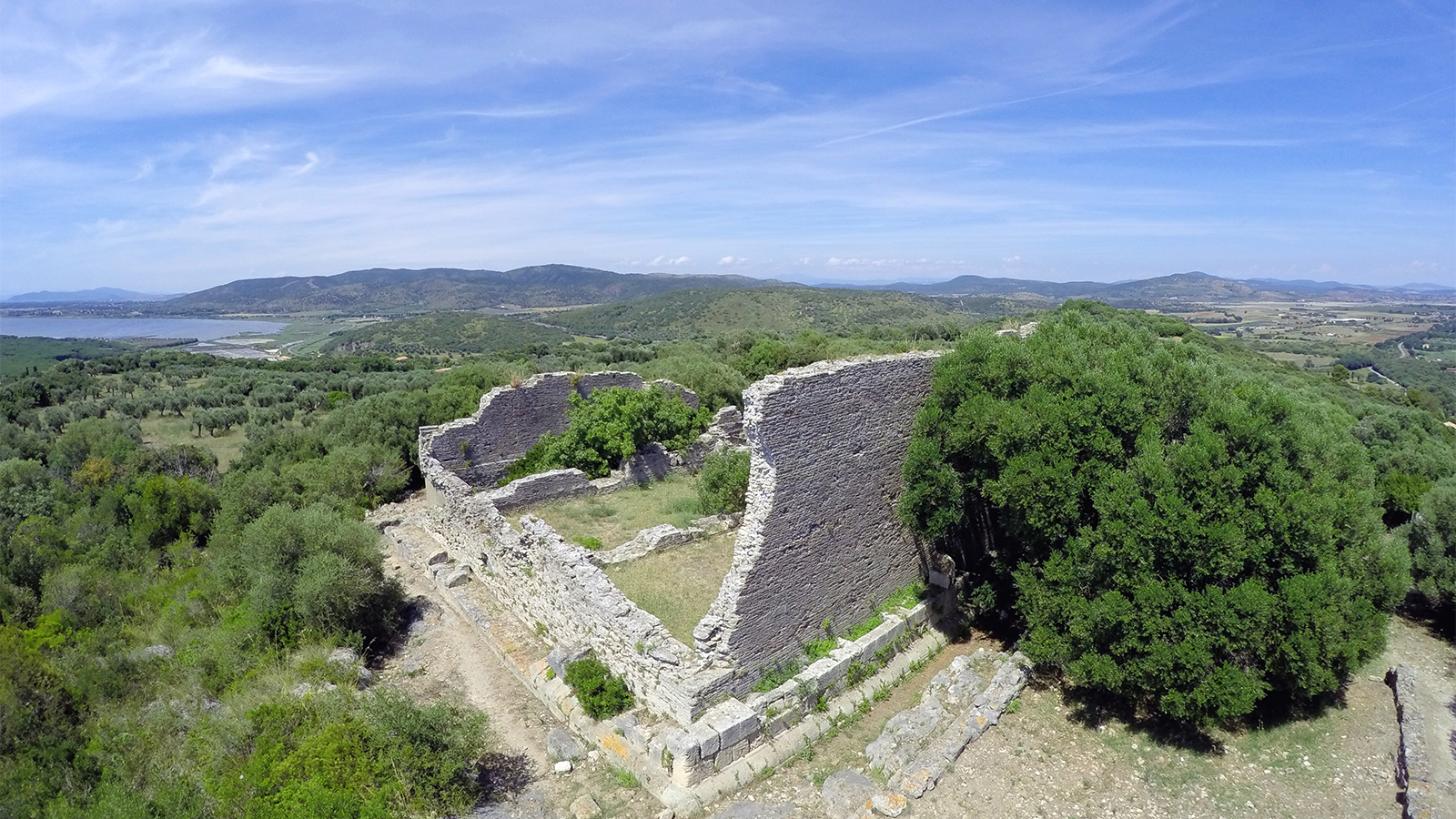Cosa: Past, Present, and Future – A Conference in Honor of Russell T. Scott

A view of the arx at Cosa, seen from the south (photograph by Matthew Brennan; courtesy of Cosa Excavations)
Download a PDF of the conference program. Included are the names of speakers, their institution affiliations, and the titles of their presentations.
May 29, 2025, 4:00–7:00pm followed by a reception, American Academy in Rome
May 30, 2025, Deutsches Archäologisches Institut, Rome
The Roman city of Cosa (modern Orbetello) was founded in 273 BCE and the excavations of this site have produced key data for our understanding of Republican-period archaeology and Roman urbanism. Excavations there have been carried out by the American Academy under Frank Brown in the 1940s, and subsequently by archeologists from the American Academy in Rome, other international projects, and now Florida State University. This conference honors the life, scholarship, and academic contributions of Russell T. Scott, Andrew W. Mellon Professor-in-Charge of the School of Classical Studies from 1984–88) and longtime director of the Cosa excavations. Former students, colleagues, and archaeologists active at Cosa will convene at the American Academy in Rome on 29 May and the Deutsches Archäologisches Institut on 30 May to celebrate the legacy of Professor Scott and present new research on Cosa.
The scope of the conference is the site of Cosa, and the central place it continues to occupy in Roman republican archaeology. It is a small site with an impressive record of research and publication that began more than seventy years ago under the leadership of Frank E. Brown, whose team was also responsible for the creation of a tourist itinerary and, what was still something of a novelty in Italy, an on-site museum. Although Professor Scott was central to this legacy, he always looked toward the future. In 2013, he spearheaded the Cosa Excavations consortium, fostering collaboration between US and German institutions, leading archaeological exploration of key sites and introducing a range of scientific approaches that have greatly advanced our understanding of the colony and its evolution. The conference will highlight emerging data from the site while also providing an opportunity to discuss them with our Italian colleagues, who have played an equally important role in bringing Cosa back into focus.
Organizers
Andrea U. De Giorgi and Maximilian Rönnberg.
Institutional Support
American Academy in Rome, Deutsches Archäologisches Institut, and Cosa Excavations
Speakers
Luisa Balandat (Universität Bonn)
Seth Bernard (University of Toronto)
Adele Bertini (Università di Firenze)
Leonardo Bochicchio (Parco Archeologico di Cosa)
Gilles Brocard (Université de Lyon)
T. Corey Brennan (Rutgers University)
Christina Cha (Florida State University)
Sophie Crawford-Brown (Rice University)
Andrea U. De Giorgi (Florida State University)
Valentina Follo (AAR)
Rebecca Frank (Colby College)
Bernie Frischer (Indiana University)
Jean-Philippe Goiran (CNRS - Université de Lyon)
Mette Marie Hald (National Museum of Denmark)
Michelle Hobart (AAR)
Melissa Ludke (Florida State University)
Richard Posamentir (Universität Tübingen)
Stefania Quilici Gigli (Università della Campania "Luigi Vanvitelli") and Lorenzo Quilici (Università di Bologna)
Martina Rodinò (Università di Firenze)
Ilaria Romeo (Università di Firenze)
Maximilian Rönnberg (University of Freiburg)
Susanna Sarti (Soprintendenza Archeologica Firenze)
Clara Schmidt (Universität Freiburg)
Celia Schultz (University of Michigan)
Allison Smith (Davidson College)
Christie Villareal (Bryn Mawr College)
Cécile Vittori (CNRS-Université de Lyon )
Jill Weber (Museum of Anthropology, University of Pennsylvania)
Thursday–Friday, May 29–30, 2025
I visitatori dell’American Academy in Rome sono pregati di mostrare un documento d’identità all’ingresso. Non è possibile accedere con bagagli o zaini di dimensioni superiori a cm 40 x 35 x 15. Non sono disponibili armadietti né guardaroba. Non è permesso portare animali (ad eccezione dei cani guida).
L’Accademia è accessibile agli utenti in sedia a rotelle e a coloro che devono evitare le scale. Si prega di inviare una email all’indirizzo tours@aarome.org se voi o qualcuno del vostro gruppo utilizza una sedia a rotelle o altri dispositivi di mobilità, così da poter garantire la migliore facilità di accesso ai visitatori. Se siete persone con disabilità o condizioni mediche che potrebbero richiedere particolari accorgimenti, vi preghiamo di inviarci un’email all’indirizzo tours@aarome.org.